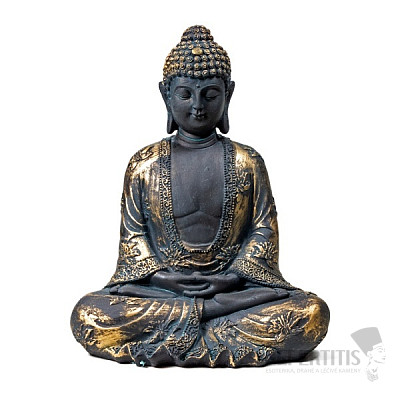Buddha meditating Japanese figurine antique look
Buddha meditating Japanese figurine antique look
Beautiful Japanese meditating Buddha statue, antique look. Symbolism: the meditating Buddha expresses concentration and stability. Height approx. 22 cm. The figurine is made of durable polyresin. The figurines are… more »
Buy and get shipping for 5 €
view shipping options
| Parcel service DE [EN] | 5.50 € | |
| Parcel service LT [EN] | 7.40 € | |
| Parcel service LU [EN] | 5.60 € | |
| Parcel service LV [EN] | 7.40 € | |
| Parcel service NL [EN] | 5.80 € | |
| Parcel service PL [EN] | 5 € | |
| Parcel service PT [EN] | 10.60 € | |
| Parcel service RO [EN] | 7.30 € | |
| Parcel service SE [EN] | 9.30 € | |
| Parcel service SI [EN] | 7.50 € | |
| Parcel service IT [EN] | 9.10 € | |
| Parcel service IE [EN] | 12.60 € | |
| Parcel service AT [EN] | 5.50 € | |
| Parcel service BE [EN] | 5.80 € | |
| Parcel service BG [EN] | 13 € | |
| Parcel service EE [EN] | 7.50 € | |
| Parcel service ES [EN] | 10.40 € | |
| Parcel service FI [EN] | 12.70 € | |
| Parcel service FR [EN] | 8.90 € | |
| Parcel service HR [EN] | 6 € | |
| Parcel service HU [EN] | 5.10 € | |
| Parcel service DK [EN] | 5.90 € |
Watchdog
Buddha meditating Japanese figurine antique look
Beautiful Japanese meditating Buddha statue, antique look. Symbolism: the meditating Buddha expresses concentration and stability. Height approx. 22 cm. The figurine is made of durable polyresin. The figurines are colored by hand and have a green patina. Illustrative image.
Another of the frequent positions in which the Buddha is depicted is the so-called meditating Buddha. In this position, the Buddha is depicted with both hands in his lap, palms up and legs crossed, either in the "double lotus" position (with the ankles of both feet tucked behind each other in a so-called locked position) or in the "single lotus" position ( where one rests on the other). He is sometimes depicted with a bowl intended for alms (money or food, which is a simple but most important item for Buddhist monks).
The statuette is meant to express great concentration, which is why the Buddha's eyes are closed or completely closed. The silhouette represents an imaginary triangle, which signifies stability .
This statuette is intended for people who are either looking for peace in their lives or for those who want to improve their own meditation skills. The figurine is placed in a room that we want to have quiet, calm or in that part of the room where we want to sit quietly and rest. Many of the largest Buddha statues in Japan, such as the Great Buddha of Kamakura at Kotokuin Temple and the large statues in Korea, are in a meditative pose. This pose is also known as Amithabha Buddha, which means "Boundless Light".
Buddha, translated as awakened, enlightened, is a being in Buddhism who has achieved perfect realization, the so-called enlightenment. Such beings are freed from the so-called three poisons of the mind, i.e. ignorance, anger and greed, and from suffering. The essence of being for them is the characteristic features of being, which means unsatisfactoriness, impermanence and insubstantiality.
The Buddha touching the Earth is the most common depiction in Thai temples. The Buddha sits cross-legged, with his left hand in his lap and his right hand touching the ground. This position is known as the "Witness Earth" mudra, also "calling the Earth to witness" and is the definition of a moment of enlightenment for the Buddha.
According to legend , Prince Siddhartha, after six years of meditation under the Bodhi tree (the leaves of the sacred fig tree), was on the verge of enlightenment. At that moment, Mara, the demon of illusion, arrived and tried to dissuade Siddhartha from taking the last steps towards enlightenment. Siddhartha meditated all night to overcome the fear and temptation sent by Mara. Mara sent her daughters to Siddhartha to distract him from the path to enlightenment. However, Siddharta turned Mara's daughters into old women with a single gesture of his hand. Subsequently, Siddharta attained enlightenment and became the Buddha, fully awakened.
Where to place the statue in the interior?
Buddha in Feng Shui is a symbol of happiness, wisdom, enlightenment, abundance, prosperity and brings positive energy.
It is generally recommended to place the statue at least a few centimeters from the ground, opposite the entrance door. The figurine is supposed to ward off negative energy penetrating the house. The Buddha must be treated with respect. If you caress the Buddha's belly, you will support its purpose, which is to amplify positive energy, fulfill wishes and desires, always be in a good mood and ward off bad luck.
Do you want to enhance the favorable effect of the Buddha statue on your home? Don't forget to smoke the Buddha regularly with incense sticks: incense sticks







